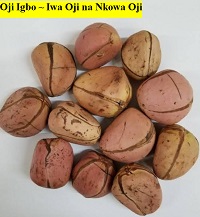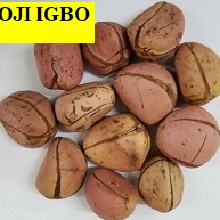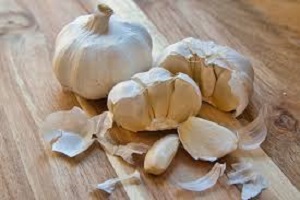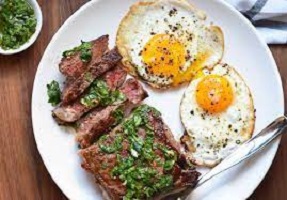Oji Igbo ~ Iwa Oji na Nkowa Oji (Breaking the Kola)
Oji Igbo ~ Iwa Oji na Nkowa Oji (Breaking the Kola Nut & Meaning). Please Watch >>>
On this special day (Christmas day) my lovely fans, pardon me to speak my language (Igbo language a little) in order to buttress my points ~ Ị ma na ọjị anaghị anụ bekee n’ala Igbo;
- Ndi Igbo na Omenala ha ~ Odinana Igbo
- Iwa Oji – Breaking the Kola Nut
- What kola nut traditionally means to Igboland – Ohaneze Ndigbo
- Why kolanut is celebrated and venerated in Igboland
- Kola nut: Nigeria’s seed of togetherness
- The Importance of Oji (Kola Nut) in the Igbo Culture
- Ontology of Oji Igbo
- Igbo Kolanut and Its Significance (Ọjị Igbo na uru ọ bara)
Table of Contents
What is this about Kolanut in Igboland? An Overview

‘Oji’ is commonly known as ‘kola nut’ in English and ‘kola’ among the Igbo tribe.
Kolanut is considered a sacred fruit in Igbo land. It is adored, respected, and revered. It is crucial in the celebration of Igbo culture and tradition.
Kola nut seed, also known by botanical names such as kola acuminate or atrophora, kola alba, and kola nitida, may have medicinal and health benefits, but the focus of this article is on the traditional and cultural significance of this fruit in Igbo land.
Evidently, it serves as a harbinger of peace. It has occupied a unique position in Ndigbo cultural life.
Ndi Igbo na Omenala ha ~ Odinana Igbo
Kola nut is more important to the Igbo people of Nigeria than the popular seed crop tree grown in Central and Western Africa.
Yes. It goes beyond the red and yellow seed nuts hawked by Hausa traders in small kiosks, village markets, and major cities in large trays.
However, it is also not a large amount of biennial agricultural crop grown, harvested, and stored in large hand-woven baskets by Yoruba farmers.
Kola nut is larger than all of these in Igbo land. It is food here, and as such, it is accompanied by a deserving feast.
It commands adoration and has many acolytes, much like the yam, the king of crops. Kola nut is eaten with relish as a food.
History of Oji Igbo/Kolanut ~ Presentation & Eating of Oji Igbo
The history of serving kolanut to visitors in Igboland is unknown, but it is one of the many things that Ndi Igbo have in common. This is a custom passed down from our forefathers. Kolanut is the first thing given to a visitor in Igboland.
If there is no kolanut to serve when a visitor enters an Igbo person’s home, the host can say “akọna m ọnụ ọjị”, “ka m jide gị ụgwọ ọjị”, “ọjị juru ụlọ” or “abalị atala ọjị” (that is, if the visitor came in the night).
Kolanut does not taste sweet when chewed, but it is an important part of Igbo traditional society.
It is used in almost every Igbo ceremony. Offering kolanut to a visitor denotes a hearty welcome to the person.
Iwa Oji – Oji Igbo Meaning
Iwa Oji literally means “kola nut cutting” (that is, the separation of the lobes of the kola nut)
Oji (also known as Kola nut) is the fruit of the kola tree, which is native to Africa’s tropical rainforests.
Although the caffeine-containing fruit of the tree is sometimes used to flavor beverages, it holds great spiritual significance in Igbo land.
The breaking, blessing, and sharing of Oji Igbo is a wonderful tradition that dates back to our forefathers.
Oji is a sacred nut that brings a community together. Its supremacy brings harmony, unity, peace, prosperity, reproduction, and progress to those who partake in kola nut blessing and sharing.
Every Igbo gathering begins with the presentation of the Igbo Kola Nut to the guest(s).
Oji is used to settle disputes between siblings or neighbors, and it is served at weddings and funerals, though the rhetoric rites are not performed at the latter.
The Importance of Oji (Kola Nut) in the Igbo Culture
‘Oji,’ plays an important role in almost all traditional celebrations and gatherings observed in Igboland, Nigeria’s Southeastern region.
One of the interesting customs that unite the Igbo people is the use of kola nuts. Today, we recognize the significance of Oji in the Igbo tradition.
Oji in the Igbo tradition and its Significance
Kola nut has become so revered in Igbo land that no marriage ceremonies, installation of traditional rulers, dispute resolution, or cultural festivals are ever held without the kola nut rituals, which must be performed in Igbo.
In every Igbo community, oji is a significant fruit that represents peace, unity, reconciliation, hospitality, goodwill, and kindness.
Oji is the first thing presented to a visitor in most traditional Igbo homes as a token of appreciation and acceptance.
Oji Igbo tradition
Many Igbo gatherings and ceremonies, such as chieftaincy, naming ceremonies, festivals, coronations, burials, and even traditional wedding ceremonies, involve Oji.
Oji is frequently included in the list of items required for most of these ceremonies, without which the ceremonies may not take place.
Before a proper occasion begins, the host usually presents Oji (Ime Oji), which is then passed on to a spiritual person or the eldest man in the audience for blessing (Igo Oji).
Using an Igbo proverb, the elder typically takes the Oji in his right hand and makes a blessing, prayer, or toast.
The Igbo language is used because it is assumed that the Oji do not understand English.
The Oji is then broken (the lobes are separated first) into smaller pieces (Iwa Oji) before being presented to everyone (Ike Oji).
In any gathering, the Oji is usually shared in a hierarchical order. The chairperson of the occasion is usually presented with Oji first, followed by an elder or an important guest.
Traditions Surrounding Igbo Kolanut
Kolanut breaking is a highly valued tradition in Igboland. Some of these customs include:
- Firstly, in Igboland, a woman does not climb the iroko tree (osisi oji). It is considered taboo and an abomination.
- In Igboland, stealing anything other than kolanut is punishable, but stealing kolanut is considered a great abomination (alu)
- Both young and old men break kolanut. People who commit abomination (ihe ala na-asọ nsọ) do not break kolanut hence, the Igbo saying “ọjị bụ nwa Amadị, aka rụrụ arụ anaghị aga ya n’ihu.” Meaning;
- (kolanut represents freedom, a filthy hand does not touch it). (A filthy hand does not touch the kolanut, which represents freedom).
- A man does not break kolanut at the home of his in-laws.
- An elderly person will not attend a gathering, and a young man will break kolanut. It is regarded as disrespectful. Unless the elderly man delegated the responsibility.
- A woman does not break kolanut in the presence of men or pray with it (iji ya gọọ ọfọ).
- Unless she is a native doctor, a woman may present a kolanut but not break it.
She can break it and eat with her spiritual entities alone. She must present a separate one for the males to break on their own.
Igbo Kolanut Variety ~ Types of Igbo Kolanut
It should be noted, however, that Ndigbo is only familiar with two species of kolanut.
The one grown in Igbo land, which bears the name ‘Oji Igbo,’ and the one produced in the western part of the country but primarily consumed by people from the north.
It is known as ‘Oji Hausa or gworo,’ and it is not used in any traditional or cultural ceremonies in Igbo land.
It is only consumed sparingly in Igbo land for the sake of consumption.
In Igbo traditional or cultural ceremonies, only ‘Oji Igbo’ is used.
The partitions of a kolanut (iberibe ọjị gbara or nkeji ọjị gbara) have a special name and meaning for Ndi Igbo. They are different types of Igbo kolanut:
Kola nuts have different lobes, and the different lobes of Kola nuts have spiritual significance in Igbo land.
- Blind kolanut (Oji isi) is kolanut without a partition (nke gbara naan otu ibe or nke gbagh ibe obula).
This kolanut is thought to be a bad omen. It is not acceptable to humans or spirits. Once seen, this type of kolanut is discarded.
Hausa kolanut (ọjị Awụsa) It comes in two partitions. Nd Igbo regard it as a kolanut that does not truly bring good fortune but cannot be discarded.
This kolanut cannot be used for prayers (ịgọ ọfọ), and it cannot be used to perform any tradition in some parts of Igboland.
- Another interesting Igbo kolanut is ọjị ikenga or ọjị dike (mighty kolanut). It comes in three partitions, which are considered wholeness or completeness. It is a kolanut that brings luck.
Other types are available in four, five, and six partitions. The four-part kolanut represents the four Igbo market days of Eke, Orie, Afor, and Nkwo. It’s also a good kolanut.
The five and six partitioned kolanuts represent wealth. Whoever breaks these types of kolanut believes that wealth will come to him.
Uses of Kolanut in Igboland
- Firstly, it is used to make a promise in order to keep a relationship or partnership.
- Secondary to make a plea on one’s or another’s behalf. It can also be used to request a favor.
- It is used to ask for a woman’s hand in marriage (to her people not to the lady directly. The man must send kolanut to the parents of the lady he wishes to marry as a declaration of his intention).
- It is used to say prayers (g f). Elders, for example, use kolanut to pray to God or a deity during a child’s naming ceremony).
- It is used to greet visitors.
- It’s used in divination.
- Lastly, can be used for sacrifice and burial ceremonies.
Women’s Role in the Breaking Of Kolanut
Oji cannot be cut, presented to, or served by a woman in Igbo culture.
In traditional Igbo society, women’s roles include making a very spicy sauce called ‘okwa ose,’ or ‘ose Oji,’ (alligator pepper or groundnut sauce) to go with the kola nuts.
In the home, a woman presents the Kola Nut to the male member of the family, usually the husband, to bless it.
The husband uses the Kola Nut to welcome guests into the home. Other gestures of welcome may be made by the woman, such as the presentation of water, food, or chalk paste.
It is important to emphasize that this is not intended to be discriminatory or to diminish women’s status in society.
However, it is a cultural tradition reserved for men, just as other expressions are for women.
Presentation of kola nut
An elderly man from the host family is responsible for presenting kola nuts to his guest.
If the local King (Eze) is present at a ceremony, it is his duty to present and bless the kola nut. This also exemplifies his position as a traditional ruler.
When guests are given kola nuts, an elderly man from the guest family will touch the kola nut and say to the host, “Òji eze nò eze na aka”
This indicates that the guest has seen the kola that was presented to them, and that the host should proceed to break and bless the kola.
The elderly man could either break the kola nut himself or assign the task to a younger man in his family.
Where the kola nut was broken by someone other than the elder, it was later passed on to the elderly man for prayers and/or blessings.
The blessing of the kola nut
The Igbo believe that Oji does not speak or understand English, which is why the adage “Oji anaghi anu bekee” was coined.
The elder, or Eze, then blesses the kola in Igbo lingua franca.
He offers a piece of the kola nut to ancestral spirits and deities before eating it on its own or with Okwa Ose (peppered butter paste) or alligator pepper before passing the rest of the kola nut around to those present.
This act implies that the host presents the kola nut with a clear conscience and a clean heart.
This myth and custom of Oji in Igbo land is a sacred tradition passed down from our great ancestors that will not be forgotten.
Its presence not only pervades and unites those who partake in it, but it also embraces an aura of symbolism that depicts happiness, life, peace, and an excellent ambience for vengeance when offered to ancestral spirits or gods for vindication and retribution.
That’s all about the Ontology of Oji Igbo. Tell us about a significant event where you were served Oji (kola nuts).
Daalụnu!
FAQs
Ọjị Igbo gbara ano Meaning
Oji gbara ibe ano dị mma na-egosikwa ahia anọ dị n’ala Igbo namely; Eké, Orie, Afo na Nkwo.
Mana, Oji gbaa ibe ise, onye wara ya nwere uru
Gini bụ oji ~ Ojí N’ala Igbo.
Ojį Igbo bụ mkpuru osisi na-amįputakwa n’osisi a na- akpo oji. O nwegi ezigbo uto di̟ ka mkpu̟rų osisi ndi ozo
Oji kola nut ~ what is kola nut in Igbo?
Kolanut is considered a sacred fruit in Igbo land. It is adored, respected, and revered.
It is crucial in the celebration of Igbo culture and tradition. Indeed, it is a sign of impending peace. It has taken a unique place in Ndigbo’s cultural life.
What is the traditional use of the kola nut?
The kola nut is chewed during ceremonies and rituals in some African countries. It’s also used to make your breath taste better.
In the Western world, the kola nut is also used as a flavoring agent for sodas.
Kola nuts are also used as an ingredient in energy drinks and performance enhancers.
What is Oji Igbo?
‘Oji,’ also known as kola nut, is clearly one of the many customs that unite the Igbos.
It is a valuable fruit with great cultural significance in the Igbo community and other cultures.
Kola nut is traditionally given to visitors in Igbo land as a token of welcome, hospitality, and acceptance
What does Oji Ikenga mean? What exactly is Oji Ikenga?
Oji Ikenga is a good omen typical of the Igbo family structure, with the male elder as the leader in the order of father, mother, and children.
Four-lobed kola: The kola nut with four cotyledons is called Oji Udo na Ngozi which means “kola nut of peace/harmony and blessing”.
How is Oji served?
Before a proper occasion begins, the host usually presents Oji (Ime Oji), which is then passed on to a spiritual person or the eldest man in the audience for blessing (Igo Oji).
Using an Igbo proverb, the elder typically takes the Oji in his right hand and makes a blessing, prayer, or toast.
What are the health benefits of Kolanut? What is the benefit of Kolanut in the human body?
Cola nut is used to treat fatigue, depression, chronic fatigue syndrome (CFS), melancholy, lack of normal muscle tone (atony), exhaustion, dysentery, atonic diarrhea, weight loss, and migraine headaches in the short term.
Cola nut is used as a flavoring ingredient in foods and beverages.
What is the side effect of kola nut?
Caffeine is found in cola nuts. Caffeine is broken down by the body in order to be eliminated.
Fluvoxamine can slow the rate at which the body breaks down caffeine.
Caffeine may remain in the body for an extended period of time, increasing the risk of side effects such as nervousness, anxiety, and insomnia.
Is kola nut good for your blood pressure?
Causes Blood Pressure Increase
Medical practitioners advise people with hypertension to avoid these nuts because their stimulant properties raise blood pressure.
However, Kola nuts can be consumed by people with normal heart function, but not in excess.
Kolanut varieties in Igboland ~ how many different kinds of kola nuts are there?
Kola comes in over 50 different varieties. Of all these seven have edible nuts, but only two have been commercially exploited (C. nitida and C. acuminata).
It should be noted, however, that Ndigbo is only familiar with two species of kolanut.
The one grown in Igbo land, which bears the name ‘Oji Igbo,’ and the one produced in the western part of the country but primarily consumed by people from the north.
Iwa Oji Igbo
Ịwa ọjị Igbo bụ otu n’ime omenala ndị Igbo nke zuru Igbo ọnụ mana usoro e si awa ya dina iche iche.
Akụkụ ọ bụla n’ala Igbo nwere usoro ha si awa ọjị
Which part of the kola nut is thrown out for the ancestors?
In most cases, ceremonies are held before the food is consumed. Each kola nut has a tiny central axis that supports and connects the cotyledon.
When a kola nut is broken, this part is given to the ancestors.
What does the breaking of the kola nut symbolize?
When a host welcomes a guest into his home, the kola nut is broken and eaten as a powerful symbol of mutual respect and community.
However, when men demonstrate their commitment to tribal values and customs, they are considered worthy of sharing the kola.
Oji Igbo Meaning
Oji Igbo means “Omenala jikotara Igbo” – a custom that brings the Igbo together.
Both cola acuminate and cola-natida (oji Igbo- native kola and Oji. Awusa- gworo as Hausa kola) kolanuts are thought to have the same symbolism.


